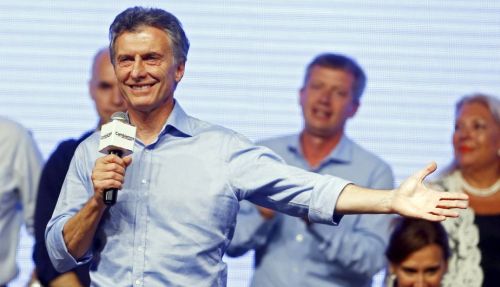Conservative candidate Mauricio Macri won 2.8 percent of votes in Argentina, which has turned right after 12 years of a national popular project.
After 99.17 percent of votes were counted on Monday at dawn, 51.4 percent of 25,100,961 voters, totaling 12,903,047 voters, chose Macri.
The candidate from Frente para la Victoria (FpV), Daniel Scioli, won the remaining 12,197,914 votes, accounting for 48.6 percent.
A rapid look at the results of the first presidential election in Argentina’s history shows that votes were polarized between the ruling party on one side and the entire opposition on the other side.
That was the idea proclaimed by the leaders of the opposition parties from the beginning to create common force to defeat the FpV.
It did not happen in the first election round on October 25, because the leadership of the Cambiemos alliance that proposed Macri refused to join the central-rightwing dissident Peronists Sergio Massa and Jose Manuel de la Sota, whose blocs made up the coalition Una Nueva Alernativa (UNA).
In fact, UNA, which groups Frente Renovador, led by Massa (Buenos Aires), and Democracia Cristiana, led by De la Sota (Cordoba), became the third major group in Argentina’s political chessboard with support from 21.6 percent of votes.
But in Sunday’s voting, the leaders of Cambiemos and UNA, especially those from the latter, wisely moved their bishops to achieve a common goal: to defeat the FpV led by President Cristina Fernandez.
Statistics substantiate that thesis: Scioli and the FpV suffered a costly setback of 71.5 against 28.9 percent of votes in Cordoba, while in Buenos Aires, they won by a close margin of 2.2 percent (51.1 against 48.9 percent), showing that they failed to capture enough Peronist voters from Massa’s party.
Divisions within the sectors of the disintegrated center-left wing, particularly Argentina’s progressivism represented by Frente Progresista Cívico Social, led by the lawmakers Margarita Stolbitzer and Victoria Donda, contributed its little weight to tilt the balance to the right.
Voters from Frente Progresista interviewed, who belong to a middle class that accommodated thanks to the economic achievements made by the FpV government, told Prensa Latina that they had voted for Macri.
The Socialist Party led by Hermes Binner (Santa Fe) and the leftwing Trotskyite forces called to vote blank, which always favors the candidate who is leading the vote counting, according to polls.
However, there was a low percentage of blank votes, only 1.19 percent, and void ballots, 1.24 percent, and that percentage was not higher due to the “No da lo mismo” (It is not the same) campaign launched by several leftwing organizations, but that 2.43 percent of void and blank ballots in such a tight election took its toll.
According to the political analyst Hernán Brienza, the political segment that represents the ideas, culture and economic interests of the ruling sectors achieved what it took a century for the old conservative liberals to achieve. He refers to access the government thanks to the popular vote of millions of Argentines.
Brienza noted that it is not bad news at least, as it proves that finally, those sectors abandoned the praetorian vocation of using the Armed Forces to stage coup d’états, as they did in the 20th century.
They succeeded in articulating a competitive political mechanism to play within the institutional system, he added, although it is not exempt of new weapons like market, judicial or parliamentary coups.
They also have a powerful weapon, the media, which was incisively used in a ferocious offensive to induce voters’ hatred against and rejection of the national popular project and especially its leader, Cristina Fernandez.
The advisors to Cambiemos, in an astute political marketing campaign, succeeded in “building a candidate who emerged from the narrow ranks of the real economic power but who, at the same time, generated the passions for aspirations of the popular segments in the middle and low classes,” Brienza added.
The main virtue of the media operation supporting Macri was having questioned and interpreted the popular sectors.
“It is, evidently, a perverse but effective trick. And in politics it is not enough to tell the truth, it is necessary to be communicatively effective. A poorly told truth correlates a bad election result,” the expert concluded. And they did not make that mistake.
 Escambray ENGLISH EDITION
Escambray ENGLISH EDITION






Escambray reserves the right to publish comments.